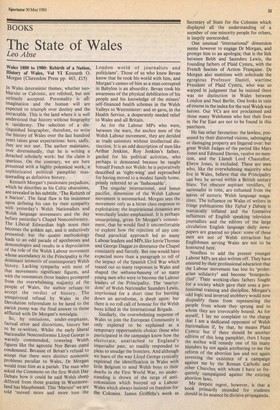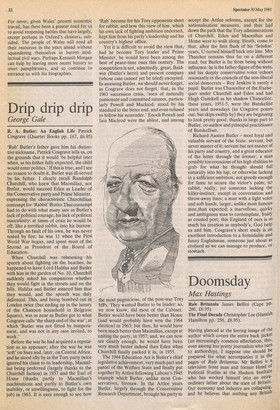BOOKS
The State of Wales
Leo Abse
Wales 1880 to 1980: Rebirth of a Nation, History of Wales, Vol VI Kenneth 0. Morgan (Clarendon Press pp. 463, /15) In Wales determinist themes, whether neoMarxist or Calvinist, are relished, but not seriously accepted. Personality is all: imagination and the human will are expected to triumph over destiny and the intractable. This is the land where it is well understood that history without biography IS taxidermy. The selection of a distinguished biographer, therefore, to write the history of Wales over the last hundred years raises great expectations: here, sadly, they are not met. The author maintains, over determinedly, that he is writing a detached scholarly work: but the claim is spurious. On the contrary, we are here Presented with a highly polemical work, a sophisticated political pamphlet masquerading as definitive history.
Kenneth Morgan's passionate prejudices, Which he describes as his Celtic obsessions, are revealed in his subtitle, The Rebirth of a Nation'. The fatal flaw is his insistence Upon defining his cast by their sympathy With yesterday's Welsh Nationalists and Welsh language movements and the day before yesterday's Chapel Nonconformity. The Liberal Edwardian high noon thus becomes the golden age, and is seductively Presented: but the quaint methodology leads to an odd parade of apotheoses and demonologies and results in a depreciation of the role of the Welsh Labour movement Whose ascendancy in the Principality is the dominant leitmotiv of contemporary Welsh history. Lacking sympathy with most of that movements significant figures, and with the resonances those leaders prompted from the overwhelming majority of the people of 'Wales, the author refuses to accept the verdict of history. The unequivocal refusal by Wales in the Devolution referendum to be lured to the parish pump was the final answer to those afflicted with Dr Morgan's nostalgia.
So, by omissions, under-emphases, factual error and distortions, history has to be re-written. Whilst the early liberal Nationalist Nonconformist Lloyd George is warmly commended, towering Welsh figures like the agnostic Nye Bevan stand condemned. Because of Bevan's refusal to accept that there were distinct economic Problems peculiar to Wales, Dr Morgan would treat him as a pariah. The man who asked the Commons on the first Welsh Day Debate how it could be said Welsh sheep differed from those grazing in Westmoreland has blasphemed. This 'Marxist' we are told 'moved more and more into the London world of journalists and politicians'. Those of us who knew Bevan know that he took his world with him, and Morgan's cameo of him as a man corrupted in Babylon is an absurdity. Bevan took his awareness of the physical debilitation of his people and his knowledge of the miners' self-financed health schemes in the Welsh Valleys to Westminster: and so gave, in the Health Service, a desperately needed relief to Wales and all Britain.
As for the Labour MPs who were, between the wars, the anchor men of the Welsh Labour movement, they are derided as trade unionists without intellectual distinction. It is an odd description of men like Arthur Jenkins, Roy Jenkins's father, gaoled for his political activities, who perhaps is demeaned because he taught himself French not Welsh: he is pejoratively described as 'right-wing' and reproached for having moved to a modest family home, primly referred to as 'fashionable'.
The singular international, and hence pacifist, dimension of the Welsh Labour movement is unremarked. Morgan sees the movement only as a bitter class response to exploitation: the inspirational dynamics are wretchedly-under-emphasised. It is perhaps unsurprising, given Dr Morgan's commitment, that he would find it uncomfortable to explore how the rejection of any confined parochial approach led so many Labour leaders and MPs,like lorrie Thomas and George Daggar,to denounce the Chapel constantly and fiercely. But one would have expected more than a paragraph to tell of the impact of the Spanish Civil War which teased out so many responses in Wales and shaped the weltanschauung of so many young men who were to become the Labour leaders of the Principality. The 'martyrdom' of Welsh Nationalist Saunders Lewis, imprisoned for a short time for burning down an aerodrome, is dwelt upon: but there is no roll call of honour for the Welsh boys killed in the International Brigade.
Similarly, the overwhelming response of Wales to join the European Community is only explored to be explained as a temporary opportunistic choice: those who participated in the campaign know how the electorate, unattached to England's imperialist past, so readily responded to pleas to smudge the frontiers. And although we learn of the way Lloyd George cynically exploited the identification in Wales with little Belgium to send Welsh boys to their deaths in the First World War, no understanding is shown of the surge of anticolonialism which buoyed up a Labour Wales which always insisted on freedom for the Colonies. James Griffiths's work as Secretary of State for the Colonies which displayed all the understanding of a member of one minority people for others, is ineptly unrecorded.
One unusual 'international' dimension seems however to engage Dr Morgan, and prompt him to an apologia; that is the link between Bebb and Saunders Lewis, the founding fathers of Plaid Cymru, with the French fascists of Action Francaise. Dr Morgan also mentions with solicitude the egregious Professor Daniel, wartime President of Plaid Cymru, who was so warped in judgment that he insisted there was no distinction in Wales between London and Nazi Berlin, One looks in vain of course in the index for the real Welsh war heroes. Our VCs are not proclaimed and those many Welshmen who lost their lives in the Far East are not to be found in this pantheon.
He has other favourites: the lawless, possessed by their distorted visions, sabotaging or damaging property are lingered over: but great Welsh Judges of the period like Mars Jones and Edmund Davies, receive no mention, and the Llaneli Lord Chancellor, Elwyn Jones, is excluded. These are men who, like the overwhelming majority who live in Wales, believe that the Principality can best be served within a British unitary State. Yet obscure aspirant versifiers, if nationalist in tone, are exhumed from the leaves of esoteric Welsh language magazines. The influence on Wales of writers in fringe publications like Tafod y Ddraig is maniacally inflated and the formative influences of English speaking television journalists and the editors of the large circulation English language daily newspapers are granted no place: some of these men are not of Welsh extraction but Englishmen serving Wales are not to be honoured here.
Needless to add the present younger Labour MPs are also written off. They have ensured by their professional education that the Labour movement has lost its 'proletarian solidarity' and become 'bourgeoisified'. Their working-class fathers fought for a society which gave their sons a professional training and discipline. Morgan's odd logic and inverted snobbery would now disqualify them from representing the people from whom they sprung and to whom they are irrevocably bound. As for myself, I lay no complaint to the charge that I am a dedicated opponent of Welsh Nationalism if, by that, he means Plaid Cymru: but if there should be another edition of this long pamphlet, then I hope the author will remedy one of his many blunders by not again attributing to me the reform of the abortion law and not again inventing the existence of a campaign against me by the Roman Catholic and other Churches with whom I have so frequently campaigned against the existing abortion laws.
My deepest regret, however, is that a book primarily intended for students should in its essence be divisive propaganda. For never, given Wales' present economic travail, has there been a greater need for us to avoid reopening battles that have largely, except perhaps in Oxford's cloisters, subsided. The people of Wales will need all their resources in the years ahead without squandering themselves in barren intellectual civil wars. Perhaps Kenneth Morgan can help by leaving more recent history to overt pamphleteers, and so continue to entrance us with his biographies.











































 Previous page
Previous page